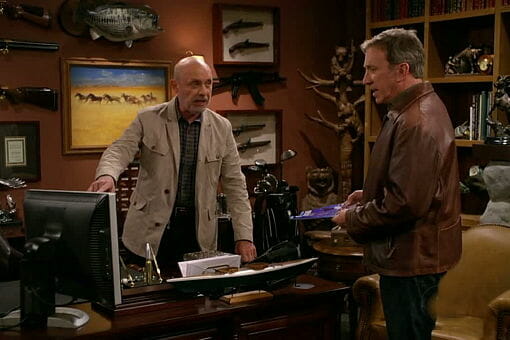By Becky Kifer · October 13, 2011

I learned one thing from ABC’s series premiere of Last Man Standing, and that is that Tim Allen would have probably hated my first boyfriend.
Tristan didn’t know how to change the oil in his car (he didn’t even own a car), loved Tolkien and enjoyed high school theater enough that he was once willing to trounce around on stage playing a Russian ballet instructor while wearing nothing but black women’s leggings and a silky green shirt.
None of these things made him any less of a man (well, let’s forget about the tights); it just made him different from anyone whose hobbies involved NASCAR, eating rare steak, and deep-sea fishing. According to Last Man Standing, however, you must follow a particular set of rules to keep your manhood. If you diverge from the good ol’ boy footpath, you’ll be lost in a wilderness of wild ovaries. But never fear, because Allen’s protagonist Mike Baxter is here to light the way and show viewers how to whip the gel from their hair and take life like a man.
As you might have gleamed, the premise of Last Man Standing is about as enlightened as Dr. Pepper telling women not to drink their soda (or Pepsi creating skinny cans for da ladies). Sitcom dads—past or present—will always fret over their daughters’ sexuality or the manliness of their sons, but unlike the patient exasperation of John Ritter in Eight Simple Rules or the sweet buffoonery of Mark Addy in Still Standing, there’s an underlying and pervasive hatefulness that seeps into Last Man Standing through its patriarch.
Mike, much like Allen’s macho, grunting toolman from Home Improvement, is a Man. At both home and work, Mike’s machismo is threatened on a daily basis. He’s employed at an outdoor supply store, where his boss, played by Héctor Elizondo, has just demoted him from managing the store’s adventure catalog to overseeing their website’s traffic. At home he is surrounded by women, from his (quite possibly alcoholic) wife Vanessa (Nancy Travis) to his three daughters—the youngest a tomboy (Kaitlyn Dever), the middle a pris (Molly Ephraim), and the eldest an unwed mother (Alexandra Krosney).
Allen, who is both star and executive producer, uses the character’s take on maleness to showcase the type of crackle-barrel philosophy that longs for the days when men were men and woman were there, and never should the societal constructs of femininity and masculinity meet. If you act too much like a woman (and this assumption relies on the fact that all females enjoy fake tans, manicures and reality television) it is a bad, bad thing. No man card for you! The audience may be laughing along with Allen, but what else do you expect from canned chuckles added during post production?
This doesn’t mean that there aren’t plenty of people who agree with the show’s view on life, obviously, but Last Man Standing perpetuates stereotypes with no thought of harm, or tact. Early in the first episode, Mike discovers that his grandson’s daycare is full of hippies and homosexuals who bake and build pillow mosques. The horror! The horror! All the show needed was a swipe at illegal immigration, and it could have won a round of insensitivity Bingo.
This is a sitcom, and no one is expecting groundbreaking comedy or social commentary—even though shows like Modern Family do manage to play off of those same stereotypes without feeling nasty. Minus these more odious elements, Last Man Standing could easily be another harmless farce about the wackiness of family life. When the show isn’t wafting testosterone in your face, there are actual moments of mindless whimsy. As used as it may be, formulaic TV can still play the Times Have Changed card. Technology and society move fast, and there’s fun to be had when Mike’s teenage daughter calls her oblivious father Voldemort or he rages against fantasy football. (On the other hand, we could all have lived without a particular genitalia joke about vlogs. I’m not even going to explain.)
Maybe the point to it all is that Allen’s character will grow; that he will branch out from his current worldwide and embrace some change down the line. Or maybe not. If the show runs as long as Home Improvement, I suppose we’ll find out. But I won’t be there to witness it. Although the second episode in the one-hour premiere wasn’t as overtly offensive, the series lost me as a viewer two minutes into its run when, after eldest daughter Kristin claims she doesn’t need a man to support herself, Mike snidely replies, “You’ve got a baby, says you needed a man once.” Ew.